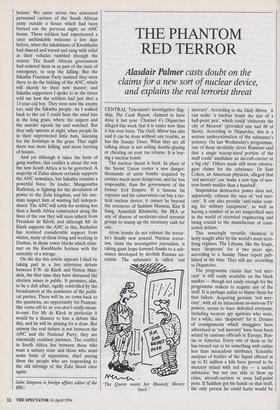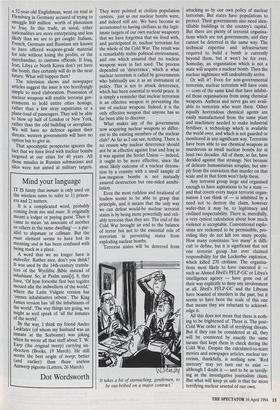THE PHANTOM RED TERROR
Alasdair Palmer casts doubt on the
claims for a new sort of nuclear device, and explains the real terrorist threat
CENTRAL Television's investigative flag- ship, The Cook Report, claimed to have done it last year. Channel 4's Dispatches alleged this week that it is easier now than it has ever been. The Daily Mirror has also said it can be done without any trouble, as has the Sunday Times. What they are all talking about is not selling double-glazing or cheating on your tax returns. It is buy- ing a nuclear bomb.
The nuclear threat is back. In place of the Soviet Union comes a new danger: thousands of atom bombs acquired by entities much more dangerous, and far less responsible, than the government of the former Evil Empire. If a famous fat reporter and his cameraman can buy a tac- tical nuclear device, it cannot be beyond the resources of Saddam Hussein, Kim II Sung, Ayatollah Khomeini, the IRA or any of dozens of moderate-sized terrorist groups to stump up the necessary cash for one.
Atom bombs do not exhaust the terror- ist's deadly new arsenal. Nuclear terror- ism, claim the investigative journalists, is taking giant leaps forward thanks to a sub- stance developed by devilish Russian sci- entists. The substance is called 'red 'The Queen wants her Maundy Money back.' mercury'. According to the Daily Mirror, it can make 'a nuclear bomb the size of a ball-point pen', which could 'obliterate the city of Moscow' (provided one had 80 of them). According to Dispatches, this is a serious underestimation of the substance's potency. On last Wednesday's programme, one of those devilishly clever Russians said that a single teacup-sized portion of the stuff could 'annihilate an aircraft-carrier or a big city'. Others made still more extrava- gant claims for the substance. Dr Sam Cohen, an American physicist, alleged that `red mercury' can 'make a new type of neu- tron bomb smaller than a baseball'.
Stupendous destructive power does not, apparently, exhaust the uses of 'red mer- cury'. It can also provide 'anti-radar coat- ing for military equipment', as well as having a number of as yet unspecified uses in the world of electrical engineering and being crucial to the manufacture of coun- terfeit dollars.
This amazingly versatile chemical is hotly sought after by the world's most terri- fying regimes. The Libyans, like the Iraqis, were 'desperate' for it two years ago, according to a Sunday Times report pub- lished at the time. They still are, according to Dispatches.
The programme claims that 'red mer- cury' is still easily available on the black market — though not easily enough for the programme makers to acquire any of the stuff. It is perhaps unfair to blame them for that failure. Acquiring genuine 'red mer- cury', with all its miraculous as-seen-on-TV powers, seems to have defeated everyone, including western spy agencies who were, for a while, also 'desperate' for it. Dozens of consignments which smugglers have advertised as 'red mercury' have been been seized by customs officials in Europe, Rus- sia or America. Every one of them so far has turned out to be something with rather less than miraculous attributes. Scientific analyses of bottles of the liquid offered at up to $1 million a kilo have proved to be mercury mixed with red dye — a useful substance, but not one able to blow up cities, aircraft-carriers or even ball-point pens. If Saddam got his hands on that stuff, the only person he could harm would be the poor official who was conned into buy- ing it.
Of course, along with ghosts, a cure for AIDS and the wicked witch of the West, it is impossible to prove definitively that 'red mercury' does not exist. But no one has managed to produce anything which indi- cates that it does. On the evidence avail- able, 'red mercury' appears to be an elaborate hoax perpetrated by one or two enterprising Russian companies to per- suade gullible governments and terrorist groups to part with money for nothing. The television programmes and newspaper arti- cles have acted as the best form of publicity by broadcasting apparently serious and detailed reports on the stunning powers of `red mercury'. Awareness of the effective- ness of advertising may be why a western journalist in Russia can always find a 'Rus- sian scientist' who will extol the astounding substance, while carefully stressing that he cannot possibly hand over a sample for analysis.
That strategy has certainly made the con- men some money. German and Austrian police have details of scores of transac- tions, most of which have resulted in prose- cutions of middlemen who have already handed over substantial sums to their Rus- sian suppliers. They are prosecuted not for illegal smuggling, but for wasting police time.
Still, the television promoters of 'red mercury' are right about one thing: the flurry of activity confirms that a lot of peo- ple are interested in buying something which they think will make it easier for them to make a nuclear bomb.
Sooner or later the result will be that they succeed. The trade in 'red mercury' may be totally fraudulent, but the trade in plutonium is not, or at least not all of the time. Weapons-grade plutonium is avail- able on the market for those prepared to pay the black-market prices. It doesn't have to come from the old Soviet Union. Any country with a nuclear power station will do — and there are now dozens of those.
A few months ago, Norman Derbyshire, 'Postman plité.'
a 52-year-old Englishman, went on trial in Flensburg in Germany accused of trying to smuggle $60 million worth of plutonium to Iraq. In this trade, as usual, other nationalities are more enterprising and less likely than we are to get caught: Italians, French, Germans and Russians are known to have offered weapons-grade material for sale without losing the profits, or the merchandise, to customs officials. If Iraq, Iran, Libya or North Korea don't yet have the bomb, they certainly will do in the near future. What will happen then?
The television shows and newspaper articles suggest the issue is too horrifyingly simple to need elaboration. Possession of nuclear weapons will enable terrorist gov- ernments to hold entire cities hostage, rather than a few stray expatriates or a plane-load of passengers. They will be able to blow up half of London or New York, rather than the odd building or aeroplane. We will have no defence against their threats: western governments will have no option but to give in. That apocalyptic prospectus ignores the fact that we have lived with nuclear bombs targeted at our cities for 40 years. All those missiles in Russian submarines and silos were not aimed at military targets. They were pointed at civilian population centres, just as our nuclear bombs were, and indeed still are. We have become so accustomed to having civilians as the legit- imate targets of our own nuclear weaponry that we have forgotten that we lived with, and participated in, nuclear terrorism for the whole of the Cold War. The result was a remarkably stable political environment, and one which ensured that no nuclear weapons were in fact used. The process depended on 'deterrence', which is what nuclear terrorism is called by governments who habitually use it as an instrument of policy. This is not to attack deterrence, which has been essential to world peace. It is simply a reminder that nuclear terrorism is an effective weapon in preventing the use of nuclear weapons. Indeed, it is the only effective weapon that anyone has so far been able to discover.
What makes any of the governments now acquiring nuclear weapons so differ- ent to the existing members of the nuclear club? As far as I can see, nothing. There is no reason why nuclear deterrence should not be as effective against Iran and Iraq as it was against the Soviet Union — indeed, it ought to be more effective, since the most likely outcome of a nuclear detona- tion by a country with a small sample of low-megaton bombs is not mutually assured destruction but one-sided annihi- lation.
Even the most ruthless and irrational of leaders seems to be able to grasp that principle, and it means that the only way we can defeat would-be nuclear terrorist states is by being more powerfully and reli- ably terrorist than they are. The end of the Cold War brought an end to the balance of terror but not to the essential role of terrorism in preventing states from exploding nuclear bombs. Terrorist states will be deterred from `It takes a bit of stomaching, gentlemen, to be out-bribed on a major contract.' attacking us by our own policy of nuclear terrorism. But states have populations to protect. Their governments also need iden- tifiable buildings in the country's capital. But there are plenty of terrorist organisa- tions which are not governments, and they cannot be deterred in the same way. The technical expertise and infrastructure required to build a bomb is currently beyond them, but it won't be for ever. Someday, an organisation which is not a state will acquire a nuclear bomb. Then the nuclear nightmare will undoubtedly arrive.
Or will it? Even for non-governmental terrorists, nuclear terrorism will have costs — costs of the same kind that have inhibit- ed those organisations from using chemical weapons. Anthrax and nerve gas are avail- able to terrorists who want them. Other equally horrendous chemical agents are easily manufactured from the same plant and machinery needed to make industrial fertiliser, a technology which is available the world over, and which is not guarded or monitored in any significant way. Terrorists have been able to use chemical weapons as murderous as small nuclear bombs for at least two decades. All of them, so far, have decided against that strategy. Not because of delicate humanitarian scruples, but sim- ply from the conviction that murder on that scale and in that form won't help them.
Any terrorist group large and organised enough to have aspirations to be a state and that covers every major terrorist organ- isation I can think of — is inhibited by a need not to destroy the claim, however wafer-thin it may be, to legitimacy and civilised respectability. There is, mercifully, a very cynical calculation about how much violence is acceptable. Conventional explo- sions are reckoned to be permissible, pro- viding they do not kill too many people. How many constitutes 'too many' is diffi- cult to define, but it is significant that not one terrorist group has ever claimed responsibility for the Lockerbie explosion, which killed 270 civilians. The organisa- tions most likely to have executed it such as Ahmed Jibril's PFLP-GC or Libya's intelligence agency — have gone out of their way explicitly to deny any involvement at all. Jibril's PFLP-GC and the Libyans have boasted of murders in the past, but it seems to have been the scale of this one that means they are reluctant to acknowl- edge it.
All this does not mean that there is noth- ing to be frightened of. There is. The post- Cold War order is full of terrifying threats. But if they can be considered at all, they will be countered by exactly the same means that kept them in check during the Cold War. Despite the calculated-to-scare movies and newspaper articles, nuclear ter- rorism, thankfully, is nothing new. 'Red mercury' may yet turn out to exist although I doubt it — and to be as terrify- ing as the investigative journalists claim. But what will keep us safe is that far more terrifying nuclear arsenal of our own.




























































 Previous page
Previous page